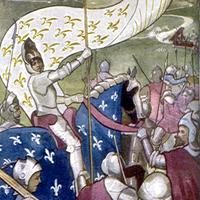39. Columbus in Chains
"When shall the world forget Thy glory and our debt, Indomitable soul. " —WATSON (Columbus). While Columbus was pleading his cause in Spain and preparing for another expedition, Vasco da Gama was sailing for the first time round the dreaded Cape. And it is curious to think that he made the coast of India just ten days before Columbus sailed for the third time for the New World he had discovered. Thus India and the East were to Portugal, at this time, what America and the West were to Spain.
It was in the month of May 1498 when Columbus started off again. After passing the Cape Verde Islands he steered to the south-west, hoping to make for new islands to the south of Cuba and Hayti. He soon found himself in a dead-calm sea. The air was like a furnace, the tar melted from off the ships, the seams yawned, the salt meat went bad, the sailors lost strength and spirits, and Columbus himself lay in raging fever. He had reluctantly to alter his course and steer to the north again.
It was three months since they left Spain, when a sailor from the mast-head saw land. Three mountains seemed to rise up out of the sea; and when Columbus reached the island—for island it was—he called it the Trinity, or Trinidad, which name it bears to-day. Then he sailed between this island and the mainland, little knowing that the land was South America, the great continent for which he had been searching all these long years.
Here he obtained a large quantity of pearls from the natives, and he would gladly have spent longer in the neighbourhood, but his stores were at an end, and he himself was nearly blind with eyes worn out with over-watching and anxiety. Passing through the narrow straits between Trinidad and the mainland, he was nearly wrecked. A foaming roaring current rushed through the narrow passage, which Columbus called the Dragon's Mouth. But he reached Hayti in safety, to be received with open arms by his brother, who had been ruling over the little Spanish colony in his absence. Things had gone ill with the colony, and Columbus did not improve matters by his presence. He was no statesman, no leader of men. He punished the leading colonists, he made slaves of the natives, and took other measures for reducing the colony to order. Complaints again reached the king and queen, who at once sent out a Spaniard to replace Columbus in his command. This high-handed knight at once put Columbus in chains and shut him up in a fortress. One day an officer entered, and Columbus thought they were going to hang him.
"Whither are you taking me?" he asked hopelessly.
"To the ship, your excellency, to embark," was the answer. "To embark? Do you speak the truth?" asked the admiral of the ocean sea.
"Indeed it is true," answered the officer. He was taken on board a ship, and in October 1500 sailed once more for home. The captain would have taken off his chains, but Columbus refused.
"No," he said proudly; "by royal order I am in chains. I will wear them till my king and queen order them to be taken off, when I will keep them as relics of the reward of my service. " It is said that the eyes of Queen Isabella filled with tears as the white-haired discoverer stood before her, his face lined with suffering. As for Columbus himself, his long pent-up feelings overcame him, and in an agony of weeping he threw himself at her feet.
Once more he was restored to favour; once more he was given ships to sail again for the new country: but there was no more success in store for Christopher Columbus.
His fourth voyage revealed little new. Driven to seek shelter in the harbour of Hayti, he was refused an entrance by the new governor of the island which he—Columbus—had given to the world. Still his dream never left him. He must reach India, he must find the home of Marco Polo's Great Khan, before he died. He still believed that Cuba was the coast of Asia. And he was to die in this belief.
He had shown the way to the West: it was for others to follow. Hardships, disaster, failure—these were now to be his lot. He returned to Spain a broken man, only to hear the news that the Queen of Spain was dead. She had befriended him when no one else was ready to believe in him, she had understood his sufferings and mingled her tears with his. Now he was friendless. Not only this—he was penniless.
"I receive nothing of the money that was due to me," he says pitifully, as he nears the end; "I live by borrowing. After twenty years of toil and peril, I do not own a roof in Spain. " "I, lying here, bedridden and alone, Cast off, put by, scouted by court and king, The first discoverer starves. " And so Christopher Columbus sailed forth on his "one last voyage. " He died in May 1506, still dreaming of some vaster Spain he yet might give his adopted country,—"the mightiest, wealthiest realm on earth,"—but all unconscious of the great continent of America, which he had made known to the wondering world.

